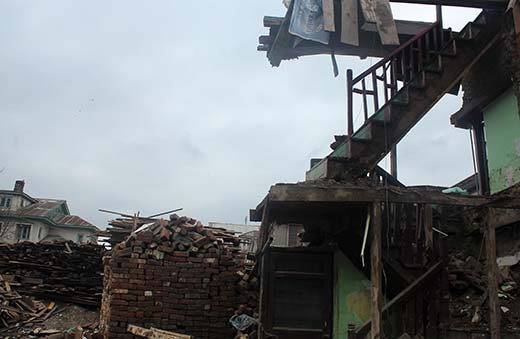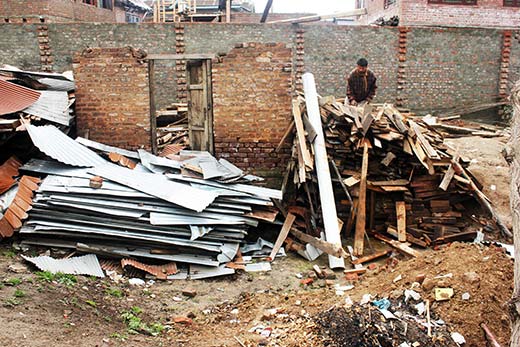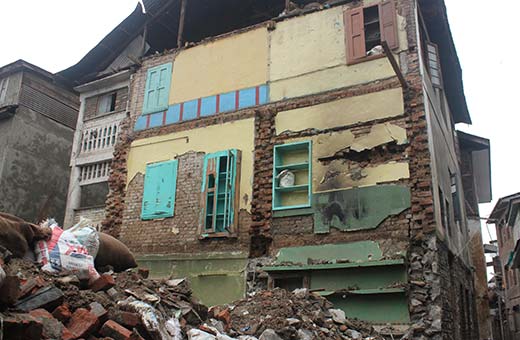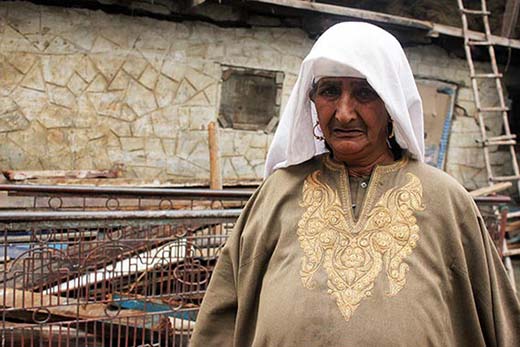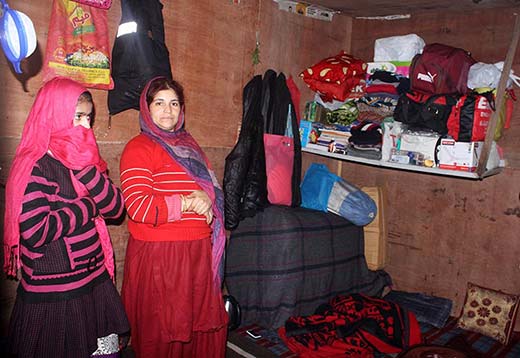Almost six months after floods hit valley, Mandir Bagh in the heart of the city continues to be a haunting place with flood-torn houses and structures. Durdana Bhat picks some untold stories from these haunting alleys
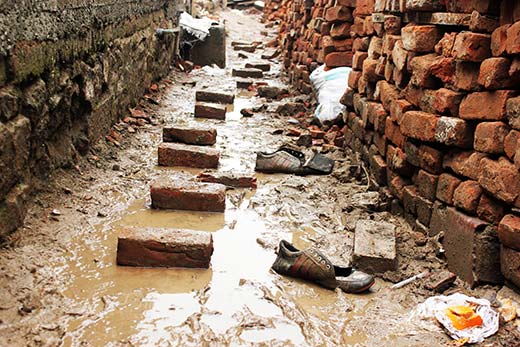
Toys, books, clothes, shoes, utensils, furniture and flooring; everything is lying in mud. Both haunting and heart-wrenching scenes are on display. Flood has made muck of everything. It all looks messy and miserable. There is an unattended electricity bill attached to a door of the crumbled house. It stares vacantly at passersby. There is no one left to receive the bill. The residents have left. Not many live here. In face of flood fury that devastated lives and properties around Kashmir in last September, the ghost lanes of Srinagar’s Mandir Bagh continue to haunt.
A walk through the unreported alleys makes one feel as if the place has been bombed on all the sides. Flood-torn walls, naked drawing rooms, exposed kitchens and collapsed structures strike a sense of complete devastation.
But before the Jhelum marched into Mandir Bagh with its roaring waters, it was a lively place. It was one of the rare places of Kashmir where Hindu and Muslims lived together. But once the flood waters entered, almost 85 per cent of families were rendered homeless. As the panic built up, almost the whole area was shrieking for their lives.
One among them was Maharaj Krishna Pandita, 61. Living at Mandir Bagh’s Gund Ahalmar, Pandita is caretaker of the Shri Gouri Shankar temple of Mandir Bagh from last 44 years. This retired government official was too trapped in floods on September 5.
“Water came in rush,” recalls Pandita, sporting a grey beard. “Later, as the screams for help got loud in the area, I along with some locals rescued eighteen people. Most of them had lost everything in floods.”
Pandita lives in a medieval house situated on the temple land. Besides him, two other Pandit families live in the same house. When flood started to destruct everything in the area, they ran for their lives and took shelter for one week at their neighbour’s house at nearby Gunpatyaar where 95 flood-hit people took refuge.
As the situation was grim, Pandita says, they had nothing to eat for three days. “Except blankets, we could not retrieve anything from our homes,” he rues. “A saving of lifetime had washed away.”
Days after, water level started receding. The residents returned. But much to their shock, a glaring destruction awaited them. Muck, dismantled structures, insects, broken walls and anonymous household item were brought out by the floods from one end to the other.
Shortly, post-flood trauma started rooting in. Like others, Sami too had lost everything. Her husband Javaid and their daughter were inconsolable. As they continue to live in a makeshift tent, a trail of memory of their flood washed home is still troubling them. “All of the sudden we were thrown on the road,” says Sami, in almost lamenting voice. “From Makhdoom Sahib to Chanapora and from Maharaj Gunj to Qamarwari, we changed many places.”
Sami’s husband doesn’t earn well. He is a local trader and sells toys at Regal Chowk on roadside stall. One private company gave them some tin sheets and plywood. And with that material, they constructed a makeshift tent. “Government gave us only Rs 75000,” she says. “And with that money, I am supposed to construct a new house!”
This sorrow of Mandir Bagh seems too strong amid cracked and crumbled houses. And what adds to their woes is the paltry government compensation. Most of them have just received Rs 3800 from the government besides some rice bags.
In those downfallen lanes, people started to voice their stories. They talk about how they left on that flood night and how they saved those who were struck inside using boats. Also, how some among them turned into daredevils while saving others.
Amid all this, Noora, an old lady dressed in pheran with wrinkled face comes rushing and stops in front of me. “Look,” he points to her flood destroyed house, “I used to live in this house but flood destroyed it.”
She lives with one of her son Shabir, a driver, who met an accident. After that tragedy, her son doesn’t earn well. “Government gave me mere Rs 12600 as compensation,” she says. “Most of that amount has gone in to a rent.”
With tale after tale unfolding from the miserable Mandir Bagh, one small girl sets her unflinching gaze at me from the front gate of her house. As I move closer to her, she takes a long time to unzip her woe: “Everything is lost. Jhelum devoured all my clothes, uniform and books!”


